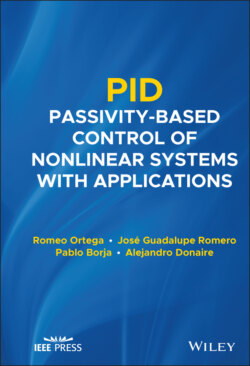Читать книгу PID Passivity-Based Control of Nonlinear Systems with Applications - Romeo Ortega - Страница 26
2.3 PID‐PBC and the Dissipation Obstacle
ОглавлениеIn this section, we reveal a subtle aspect of the practical application of PID‐PBC, namely that for passive systems of relative degree one, there exists a steady state only if the energy extracted from the controller is zero at the equilibrium. The latter condition is known in PBC as dissipation obstacle and is present in many physical systems, for instance, all electrical circuits with leaky energy storing elements operating in nonzero equilibria – i.e. capacitors in parallel, or inductors in series, with resistors. Interestingly, this obstacle is absent in position regulation of mechanical systems since dissipation (due to Coulomb friction) is zero at standstill.
After briefly recalling the nature and mathematical definition of the dissipation obstacle, we prove the claim of inexistence of equilibria stated above in a more general context than just PID‐PBC, namely for all dynamic controllers incorporating an integral action on a passive output of relative degree one.
